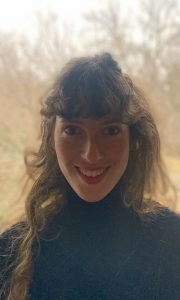What do mystery, mayhem, and the Wisconsin Institute for Discovery have in common? The Writer-in-Residence Program, recently welcomed Kayla Cohen as a part of the Illuminating Discovery Hub at the Wisconsin Institute of Discovery. The residency is an opportunity for an up-and-coming writer to work among scientists while crafting a manuscript with scientific themes. Kayla’s novel about a girl/budding scientist caught up in a matrix of mysteries has already been accepted by a major literary agent.

Kayla Cohen
How did you find out about the Writer in Residence Program?
I used to work at WID in 2019, collaborating with Jo Handelsman on her book about soil erosion (A World Without Soil). At that time, the idea for a WID writing residency was just that: an idea. I was excited for it to become a reality because I could see the potential for a new program that offers aspiring writers like me, who are super curious about all-things-scientific, a chance to peek into scientists’ brains and get to grips with their research.
Why is it a good fit for you and your novel?
It is my dream opportunity! Science is the life-blood that courses through my mystery novel. So far, my interviews with WID scientists have impacted every aspect of the book, from its setting to the main plot twist. Everyone I have approached has been open to discussing their journey into science and showing me around their labs. Since my protagonist is twelve-years-old, I am especially interested to learn about scientists’ childhoods and their first forays into the discipline.
Two months into this residency I can whole-heartedly say that it has been life-changing. It is a privilege to have a quiet office, funding and a community of scientists supporting me as I undertake my debut.
What did you do to prepare for your residency at WID?
For years, I’ve been writing fiction in every nook of time I could find to hide in. Over summer breaks, after work, between seminars, on public transport, always scribbling ideas in the margins of my mind if wanting for a page. This is how I assembled a small portfolio, among which was the startings of a mystery novel. During the pandemic and the third London lock-down, I decided to take a risk. I sent the first five chapters to three literary agents and received encouraging responses. I was completely shocked and thrilled to sign with the Levine Greenberg Rostan Literary Agency. Just before coming to the U.S. on a visa to do this residency, I completed a short course on Crime Fiction at the Institute of Continuing Education at University of Cambridge. I’ve also taken a masterclass in novel writing at The Guardian.
What is unique about WID?
WID is a special place. I think it attracts visionary scientists at every stage of their careers – from undergrads to principal investigators – who are willing to take risks in their research. Behind every lab door, there is something mind-blowing afoot. And WID research has soul. Researchers are driven by goals far greater than personal success, often related to medical breakthroughs or advancing humanity’s quest for knowledge. Perhaps many science institutes are like this – I hope they are – but I have the privilege of seeing these qualities in the people and projects housed at WID.
Another unique aspect of WID is its commitment to interdisciplinary collaboration, which extends beyond scientific research to the arts. There are many programs here that bring artists and scientists together to help communicate research in vivid and inclusive ways. The writing residency is just one example!
What is your original field of study?
As an undergraduate, I double majored in Natural Sciences and Arts and Humanities. The former was an accident. I took an elective in evolutionary biology and fell head over heels with phylogenetic trees. By contrast, my interest in literature and creative writing is long standing. I organized my university’s writing club for four years and, when I wasn’t studying, I was bumping into trees and missing trains (head stuck in a book, reading).
While still working with Jo on the book, by then in a part-time capacity, I completed a master’s in Environment and Development at the London School of Economics. I loved learning about the political dimension of environmental issues and honing my critical eye, which I aim to bake into my fiction writing.
What is your typical work day?
I wake up horribly early despite optimistically setting my alarm for 7.15am. I mosey down to the kitchen and fill up on coffee. Then, I make the 30-minute pilgrimage from my desk at home to my desk at WID. Sometimes, I’ll hum as I set up my computer, readying myself for a day’s work. My chapters are between two and three thousand words and so, realistically, I can write a terrible full draft or a shoddy version of half a chapter (I’ll clean it up the next day to workable standards). A quick lunch. Perhaps, I’ll have an hour-and-a-half interview with a scientist and tour their lab. Between 5 and 6, I’ll walk back home, chatting with my characters, asking them hypotheticals. Sometimes, to meet a self-imposed deadline, I’ll work later into the night.
Why is it important to increase accurate scientific representation in mass media?
I could write an essay-load of answers to this question. I’ll keep it brief, though, and say that in an era when people attack common sense truths and the value of having integrity, science takes on a symbolic role as the antidote. The scientific process is a humbling reminder that humans are never certain about anything. We can only ask nature questions and record its answers, to paraphrase Max Planck. To me, the fact that humans conduct scientific experiments as eternal students of the universe is a source of hope. Research hones our best qualities: our capacity to be curious, to withhold judgment, to listen, to work together and to be awed by the awesome. The more we can accurately portray science to wider audiences, the more people can partake in this cross-generational endeavor to amass knowledge about our shared existential situation.
Like many writers, I am writing the book that I would have benefited from reading as a child. I always thought of science as a foreign language I would never be able to speak. I realize now that I didn’t need to think that. I don’t want other people to deprive themselves from the joys of scientific literacy just because they think science is inaccessible. Accurate representations of the scientific process and the people who work in science can help to change that. I hope my book is a drop in that wave.
What would you like to see happen as a result of this residency?
I would like to complete a full draft of my novel within the first six months of this residency. After that, I imagine there will be lots of editing to do before my agent sends it on to publishers. I am also looking forward to designing and facilitating creative writing workshops for WID scientists and the public!
What advice would you have for someone who wants to write a science-inspired novel?
I’d give them the advice I tell myself everyday: be kind to yourself. You are doing something unstructured, self-driven, complex and difficult. There will be good and bad days of writing. That doesn’t make you a good or bad person. It just means that you are growing, and that’s got to be worthwhile within itself.


